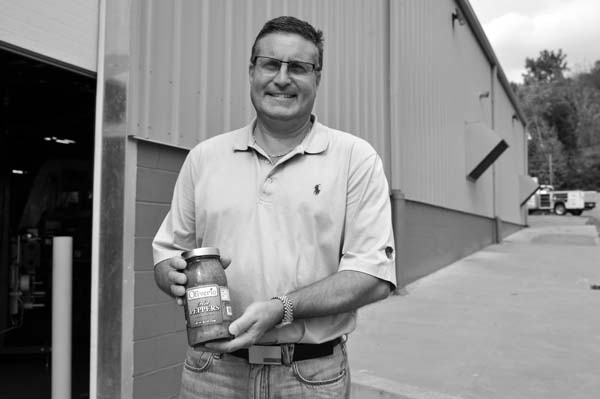Packing Pickled Peppers in Clarksburg
An Oliverio Family Tradition
Text and photographs by Carl E. Feather

Mark Oliverio with a jar of peppers at the family-owned processing plant in Clarksburg. Photograph by Carl E. Feather
Mark Oliverio’s arms were “on fire” when he stopped by his aunts’ store, Oliverio’s Cash & Carry, on a Monday afternoon in early October.
Mark, 49, had been cooking peppers in tomato sauce all day, toiling over gurgling, 125-gallon stainless-steel pots that send scalding splatters onto his bare arms whenever they ventured into the cauldron’s air space. These pots, and the hard work that goes into tending them, are at the heart of the family’s Italian sauces and specialties business, Oliverio Italian Style Peppers, of Clarksburg. Family owned, the business combines tradition with modern food processing technologies and marketing.
On a peak production day in autumn, the plant will process up to 2,500 cases of product. If banana peppers are the product, the plant has the capacity to process a tractor-trailer load of the vegetable in one day. These numbers are achieved with automated processing and packaging equipment operated by 20 or more workers.
In 1973 when Mark’s father, Frank, took the family recipe to the masses, he and a dedicated group of family and friends canned 75 bushels of peppers a day on six stoves in the back of Oliverio’s Cash & Carry store. All of the work, from washing and cutting up the peppers to screwing on the jar lids, was done by hand.
“We’d have six [metal] pans going on six stoves,” Frank Oliverio says. “I would get up and start at 5 a.m. and get the pans and water ready. By the time Mother came down at 6:30 a.m., we’d be ready to start canning.”
Frank and his mother, Antoinette, produced their product in that manner for three summers, until Frank assembled $100,000 in loans from the Small Business Administration (SBA) and family members to purchase equipment that automated the process.
“I spent that $100,000 before I bought my first bushel of peppers,” Frank says. Even with the automation, workers still had to touch each pepper four times before the vegetables could head to market under the Oliverio’s label.
Nearly 40 years later, the peppers are touched but once after arriving at the factory in semi-trucks. A line of workers eye the vegetables for quality, break off the tops, and send the approved ingredient into the blanching tank. Despite the high level of automation, quality and fidelity to the family’s recipes are maintained by human intervention at the cooking and packing stages. And while Mark says that putting his taste buds on the production line ensures consistency, the intangible ingredient that goes into every jar or barrel of peppers or sauce is the Oliverio family’s value system.
“It’s not so much the recipe as it is just doing the work. And it is a lot of hard work,” he says.
The Oliverio name has been associated with Clarksburg’s food scene ever since Mark’s grandparents, Antoinette (Lepera) and Frank Anthony Oliverio, opened a grocery store in the Glen Elk community nearly a century ago.
You can read the rest of this article in this issue of Goldenseal, available in bookstores, libraries or direct from Goldenseal.